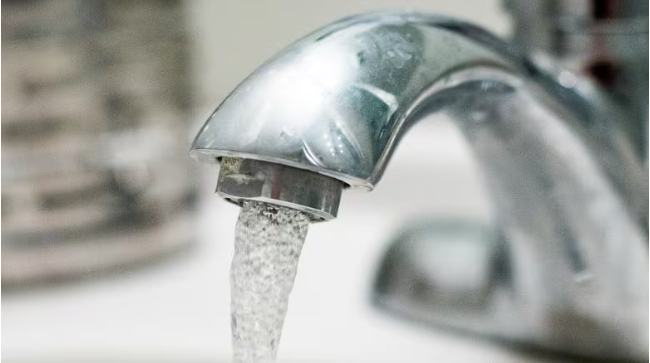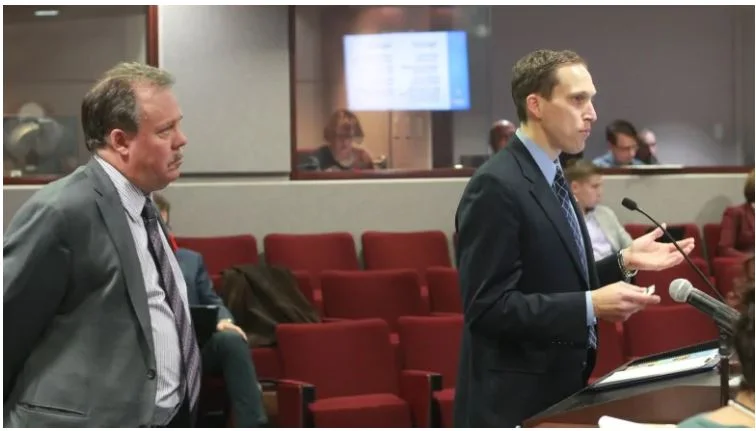It's part of the city's monitoring for cyanobacteria, or blue-green algae, in the water supply for the province's largest metro area. The photosynthetic bacteria can be found in many waterways and isn't necessarily harmful, but some types can produce toxins harmful to humans and animals. The discovery of cyanobacteria in the reservoir six years ago triggered a multimillion-dollar research and upgrade effort that's ongoing.
Boil water advisory issued for Alma
A boil water advisory has been issued for the village of Alma, about 79 kilometres south of Moncton, because of high levels of turbidity in the reservoir. "These levels exceed the New Brunswick maximum acceptable concentrations," a notice issued by the local government on Wednesday morning says. Recent heavy rainfall caused the problem, according to chief administrative officer Hanna Downey — a drastic change from last weekend when the village almost ran out of water and had to urge residents to conserve as much as possible.
High levels of E. coli bacteria close 2 Moncton lakes
The City of Moncton says Jones Lake and the lake at Centennial Park are closed to recreational use until further notice because of high E. coli counts. The city issued a public advisory Wednesday, saying routine testing found high counts of the fecal bacteria. The lakes are closed for swimming, kayaking, canoeing and other recreational activities, and dogs should not be allowed to swim in or drink the water.
COVID-19 surged in Fredericton over holidays, new wastewater data reveals
Fredericton had a surge of COVID-19 just after the holidays, newly released wastewater data indicates. The capital was added to the Public Health Agency of Canada's COVID-19 wastewater surveillance dashboard Tuesday night, joining Moncton as the second New Brunswick location on the national website launched nine months ago. Data dating back to Dec. 22 shows Fredericton's seven-day rolling average of viral load, expressed as the number of viral gene copies found in a millilitre of raw sewage, started out at 17 copies/ml.
New Brunswick to open public health lab in Moncton in 2024
The New Brunswick government plans to open a public health laboratory in Moncton by 2024 at a cost of about $10 million. Health Minister Dorothy Shephard announced the plan Wednesday morning with work expected to begin this fall. "The COVID-19 pandemic has shown the need for New Brunswick to have its own provincial public health laboratory to ensure a dedicated public health response," Shephard said.
2 years after legionnaires' outbreak in Moncton, cooling tower registry not in place
Cooling towers use water evaporation to remove heat and release it into the atmosphere. If legionella bacteria is present in the water, it can be aerosolized and spread over several kilometres by the wind. Those who inhale water droplets with the bacteria may then contract the illness. It doesn't spread person-to-person. After the 2019 outbreak in Moncton where 16 contracted the severe form of pneumonia, the regional medical officer of health said he'd support more rules for building owners to try to prevent future outbreaks.
Green layer of scum on Jones Lake in Moncton not toxic, city says
Much of the surface of Jones Lake in Moncton's west end is covered by a thick, green layer of scum. The city has determined it's "horse hair" algae, also known as "cotton ball" algae. Dan Hicks, the director of parks for the city, says it might not look good, but it isn't toxic to people or pets. "It doesn't cause really human health issues in any great way, but there's certainly an abundance of it in Jones Lake right now," he said.
Rain barrels a hot commodity as summer approaches
Last year's hot, dry summer, an increased interest in home gardening, and a rising awareness of the effects of climate change have people turning to rain barrels. Macx MacNichol, owner of ECO-Containers in Dorchester, converts food-grade plastic containers into rainwater-harvesting systems ranging in size from 205 litres to 1,000 litres and priced from $45 to $205. He buys the used containers from different industries in and around Moncton. MacNichol said they've been harder to come by since the pandemic started because some of his suppliers have closed, and others aren't as busy. Coupling that with an increase in demand for his product means, "every barrel that comes in today, is spoken for tonight," said MacNichol. He said last year's dry summer got people's attention.
Canada and New Brunswick invest in Moncton's drinking water system to support residents
Today, the Honourable Ginette Petitpas Taylor, Member of Parliament for Moncton–Riverview–Dieppe, on behalf of the Honourable Catherine McKenna, Minister of Infrastructure and Communities; the Honourable Ernie Steeves, Minister of Finance and Member of the Legislative Assembly for Moncton–North; and Her Worship Dawn Arnold, Mayor of Moncton, announced funding for improvements to Moncton's potable water system. These upgrades will result in safer drinking water by implementing technology to remove harmful toxins that blue-green algae can produce in potable water systems.
Moncton lays groundwork to deal with cyanobacteria in water supply
Moncton plans to spend $6 million this winter to upgrade its water treatment plant, the first phase of a plan to deal with cyanobacteria in the municipal water supply. Cyanobacteria was found in 2017 in the Turtle Creek watershed, the drinking water source for Moncton, Dieppe and Riverview. Cyanobacteria, also known as blue-green algae, can form blooms and produce toxins harmful to humans and animals. The water remains safe to drink and the multimillion dollar upgrades are meant to keep it that way.
Moncton could spend $27M on 'worst case' algae fix
Moncton's $77.6-million capital budget sets aside millions to deal with blue-green algae in the municipal water supply. Jack MacDonald, Moncton's general manager of engineering and environmental services, said the city will work with Dalhousie University to study whether a water purification system could be added at the treatment plant to handle the algae.
Glyphosate will not be sprayed near Greater Moncton's water supply this year
The provincial government did not issue a permit to spray the controversial herbicide glyphosate this year near the Turtle Creek Watershed, the water source for greater Moncton. The decision comes after an outcry from Moncton Mayor Dawn Arnold last August. 'Well, I'm pretty excited," Arnold said after learning the news over the weekend.













